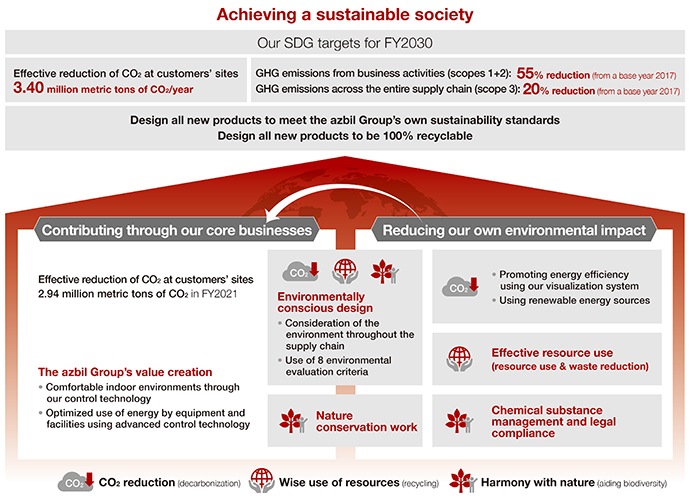Accelerating initiatives to realize carbon neutrality
Based on the global trend of reducing greenhouse gases to combat global warming, we aim to reduce CO2 emissions both in our own business activities and by helping to preserve the environment through our core businesses
As a countermeasure against global warming, reducing greenhouse gas (GHG) emissions, including carbon dioxide (CO2), has become an important theme in every country around the world. In accordance with the “2050 Carbon Neutral Declaration” announced by the government in October 2020, and with the vision of a decarbonized society, the azbil Group set GHG reduction targets to help preserve the environment through its business activities and through the products and services it provides. We are accelerating the development of measures to achieve that goal.
- Implementing measures to realize a decarbonized society with the SDGs as guideposts
- GHG reduction targets revised upward amid the rapid trend to reduce CO2
- Supporting energy conservation at customers’ sites by providing a variety of solutions
Implementing measures to realize a decarbonized society with the SDGs as guideposts
With growing concern about climate change and global warming, the reduction of greenhouse gases (GHG)*1 has become a pressing issue on a global scale. Action to prevent climate change is one of the SDGs*2 formulated at the United Nations Summit in September 2015, and it was also adopted and drew attention in December of the same year in the Paris Agreement, an international framework for global warming countermeasures. Signatories of the Paris Agreement agreed to keep the increase in the global average temperature to well below 2 °C compared to pre-industrial levels, and to work to limit it to 1.5 °C. This agreement accelerated the GHG emission reduction movement in every country of the world. In Japan, the 2050 Carbon Neutral Declaration was announced at an extraordinary session of the Diet on October 26, 2020, with the goal of reducing GHG emissions to virtually zero by 2050. Various initiatives are underway to reach this goal.
In January 2020, the azbil Group, which has been actively working to reduce CO2 emissions through energy conservation, formulated its 2050 Long-Term Vision for Reducing Greenhouse Gas Emissions, in January 2020. Currently, as milestones, we have set long-term quantitative targets for 2030, and are developing a trial for international use of “Integrated Environmental Corporate Management”*3 that combines business activities and environmental measures. Moreover, with the SDGs as important guideposts directing our management, and aiming to make contributions that lead “ in series” to a sustainable society and to achieve sustainable growth, the azbil Group is working on its own initiatives to help achieve a decarbonized society.
GHG reduction targets revised upward amid the rapid trend to reduce CO2
The azbil Group’s efforts to realize a carbon-neutral society have, broadly speaking, two focuses: our own business activities and action through the products and services we provide to our customers. In the former, we reduce the environmental impact of our own business activities. We have set a goal of reducing GHG emissions (scopes 1 + 2)*4 in the azbil Group’s business activities by 30% (compared to the 2013 level*5) by 2030, as announced in 2019. This target has been recognized as scientifically grounded for achieving the Paris Agreement’s 2 °C target, and has been certified by the SBT Initiative (SBTi).*6 Furthermore, in response to the rapid movement of society as a whole in recent years toward reducing GHG emissions, in August 2021 we revised our target upward to a 55% reduction (compared to 2017). This target was certified by SBTi as a 1.5 °C target that is consistent with the goal of keeping the temperature rise below 1.5 °C compared to pre-industrial levels.
To achieve these goals, we (including our business sections) must strengthen our environmental measures. Azbil Corporation has cultivated a variety of energy-saving technology, such as systems that support the visualization and analysis of energy consumption, in both its Building Automation business and Advanced Automation business. We are working to promote electricity and energy conservation within the azbil Group using these systems. In addition, we are working to save energy by making the facilities and equipment related to our business activity more efficient, and promoting a wide range of initiatives such as replacing gasoline vehicles with hybrid vehicles and electric vehicles (EVs).
Furthermore, with regard to scope 2, we are working to increase the ratio of renewable energy procurement at the azbil Group’s main bases. We have already achieved 100% renewable energy procurement at our Hadano Distribution Center and Shonan Factory.

The azbil Group’s environmental initiatives to realize a sustainable society
Supporting energy conservation at customers’ sites by providing a variety of solutions
The other focus of the azbil Group toward achieving a carbon-neutral society is to contribute through the provision of products and services. By providing automatic control systems that support energy-saving operation of building equipment, advanced control solutions that stabilize and optimize production process equipment, and various energy management solutions, we are contributing to the energy efficiency of our customers. In fiscal year 2021, the azbil Group cut 2.94 million tons of CO2 per year at customers’ sites. This equals about one four hundredth of the total CO2 emissions in Japan for a year (about 1.2 billion metric tons), which means that the azbil Group’s business activity cut about 160 times as much CO2 as we emitted in 2021 (19,000 tons). Our target for 2030 is to increase this reduction to 3.4 million metric tons of CO2 per year.
Regarding the indirect emissions related to our entire supply chain (scope 3), which means the GHG emissions from customers using products and services provided by the azbil Group at their sites and the GHG emissions from the production processes of parts suppliers, we have set a 20% reduction target compared to 2017. This target was also certified by SBTi. In order to achieve this, we are strengthening our environment-friendly design by (1) resource-saving design, downsizing products and reducing the number of required parts as much as possible, and (2) energy-saving design that enhances the energy efficiency of the product itself. Additionally, as a new SDG-related target, we decided to design all new products to be 100% recyclable. Starting from product design all the way to final disposal, our products will be made based on the azbil Group’s own sustainability standards, which incorporate best available technology (BAT)*7 and will allow products to be disassembled, separated, and recycled by our customers.
Domestic and overseas Group companies continue to formulate roadmaps to reach their common goal of achieving carbon neutrality by 2050. In recognition of these efforts, in December 2021 we were rated by the CDP,*8 an international environmental nonprofit organization, as one of only a few hundred excellent companies worldwide in terms of efforts and information disclosure in the categories of climate change and water security. We were selected for the A list (highest rating) for climate change, and received an A− for water security.
The azbil Group will continue to earnestly work toward the realization of a carbon-neutral society, which is an important countermeasure against global warming and climate change, which are pressing problems common to the whole world.
*1 Greenhouse gases (GHGs)
A general term for gases in the atmosphere that cause a “greenhouse effect” by absorbing part of the infrared radiation emitted from the Earth’s surface.
*2 Sustainable Development Goals (SDGs)
International goals adopted at a United Nations summit in 2015 for the period from 2016 to 2030. Seventeen goals and 169 targets were established in order to achieve a sustainable, diverse, and inclusive society where no one will be left behind.
*3 Integrated Environmental Corporate Management
Management in which of a wide range of environmental action is included in the course of business, including CO2 reduction, resource recycling, and biodiversity preservation.
*4 Greenhouse gas scopes are as follows.
Scope 1: direct GHG emissions from a business (from burning fuel and industrial processes)
Scope 2: indirect GHG emissions from the use of electricity, heat, or steam provided by another business
Scope 3: indirect GHG emissions related to business activities (emissions not included in scopes 1 and 2)
*5 2013 level
The goals officially approved by the SBT initiative are based on the fiscal year, for both base year and target year, and years are written as fiscal years for these goals.
*6 SBT initiative (SBTi)
A group jointly established by CDP, the World Resources Institute (WR), the World Wide Fund for Nature (WWF), and the United Nations Global Compact (UNGC) to promote the achievement of greenhouse gas emission reduction goals. It is an international initiative to certify that a company’s CO2 emission reduction goals are consistent with scientific evidence.
*7 Best available technology (BAT)
The most effective technology that is both economically and technologically viable.
*8 CDP
An international environmental nonprofit organization that operates a global environmental information disclosure system for companies and local governments. Founded in the UK in 2000, it works with over 590 investors with over US $110 trillion in assets to encourage companies to disclose environmental information, reduce greenhouse gas emissions, and preserve water resources and forests through capital markets and corporate procurement activities.
This article was published on January 1, 2023.

